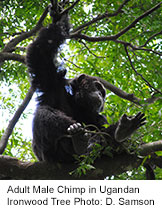- Are You Making This Expensive Thermostat Error This Winter?
- Recognizing the Signs of Hypothyroidism
- 10 Strategies to Overcome Insomnia
- Could Artificial Sweeteners Be Aging the Brain Faster?
- Techniques for Soothing Your Nervous System
- Does the Water in Your House Smell Funny? Here’s Why
- Can a Daily Dose of Apple Cider Vinegar Actually Aid Weight Loss?
- 6 Health Beverages That Can Actually Spike Your Blood Sugar
- Treatment Options for Social Anxiety Disorder
- Understanding the Connection Between Anxiety and Depression
Chimps Prefer Firm ‘Mattress’


Like many people, chimpanzees are picky about their beds, a new study finds.
Specifically, these primate cousins prefer firm and stable types of wood to build beds or nests in trees, according to the study published April 16 in the journal PLoS One.
“Chimpanzees, like humans, are highly selective when it comes to where they sleep,” said researcher David Samson of the University of Nevada. “This suggests that for apes there is something inherently attractive about a comfortable bed — down to what kind of wood you use to make it,” he said in a journal news release.
The researchers looked at 1,800 nests built by chimps at the Toro-Semliki Wildlife Reserve in Uganda and focused on branches from the seven tree species most commonly used for those nests.
Even though Ugandan ironwood accounted for only about 10 percent of trees in the area, that type of tree was used in nearly 74 percent of the chimpanzees’ nests.
Of the seven tree species, Ugandan ironwood was the stiffest, had the greatest bending strength, the smallest distance between leaves on the branches, and the smallest leaf surface area, the researchers said.
They believe these properties are important to chimpanzees because they offer protection from predators and diseases, and also provide temperature regulation and comfort.
More information
The Jane Goodall Institute has more about chimpanzees.
Source: HealthDay
Copyright © 2026 HealthDay. All rights reserved.










